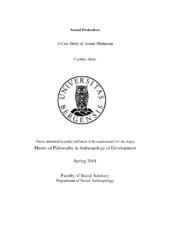| dc.description.abstract | ABSTRACT Studies have shown that formal insurance in developing countries are rare. As a result, insurance in these countries are usually achieved through reciprocal support arrangement where there is risk-pooling among members to support each other in times of shock and adversities. Though ethnographers have described many different ways in which people cope with risk, the topic still remain unexplored area of research. The aim of this master thesis was to gain a better understanding of the measures and mediums through which the people of Asante Mampong in the Ashanti Region of Ghana insure themselves against social and economic insecurities. I outlined the ways of building up security through being a responsible social actor, as well as being a person who take actions towards security with micro finance and credit unions. I used the theory of social capital as a way to bridge the age-old sociological dichotomy of structure and agency. I draw on Robert Putnam's social capital theoretical conceptions of trust, norms and social networks to examine the ways in which people that lack formal social protection secure and insure themselves. The study relied on qualitative data, gained from participant observation, during six months fieldwork in Asante Mampong, and coupled with interviews with key informants to provide data for analysis. The study found that livelihoods in Asante Mampong are embedded in social relationships. At the centre of these social relationships are individuals who are members of many different social circles. These relations are very important to further individual goals and aspirations. The people are conscious of this fact and through social networks, coupled with trust and accepted norms of expected behaviours employ them to accomplish their goals and further their present as well as future aspirations. The thesis therefore, argues for the usefulness of social capital as an analytical tool in the study of social protection. Keywords: Social protection, Insurance, Informal insurance, Social capital, Trust, Norms, Social network, Reciprocity. | en_US |
